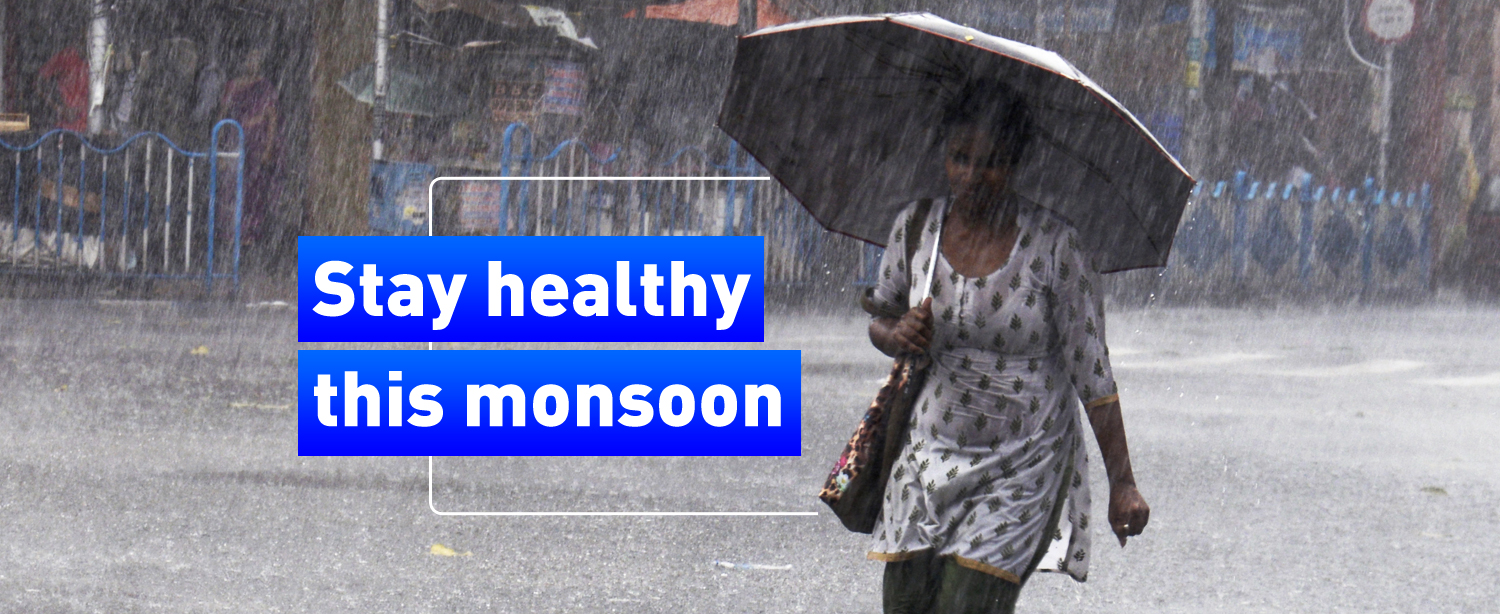It’s that time of the year again! The cool breezy monsoon winds, the soft drizzle, the heavy rains are here to refresh you. It is the best time to relish a hot cup of masala chai from your window or balcony as you admire nature. However, rains also mean jumping over dirty muddy puddles, water-logging, an increase in mosquitoes, frequent seasonal infections as well as food-borne diseases. The monsoon season gives mixed feelings to many and people share a love-hate relationship with it. While this season gives a much-needed break after the sweltering summer it is also known to bring along viral infections like flu, malaria, and dengue. Additionally, the high humidity can contribute to numerous skin diseases and fungal infections and aggravate chronic skin conditions such as eczema, acne, and psoriasis.
Stay Healthy this Monsoon
The monsoon season is known to spread many infectious diseases. Follow these health tips to stay healthy this monsoon:
- Eat more vegetables
Avoid eating raw vegetables as they may contain bacteria and viruses which can lead to severe stomach infections, food poisoning, or diarrhoea. Boiled and steamed veggies are the healthiest options since they are high in proteins, fibre, and other nutrients.
- Drink safe water
Drinking water, even if mildly contaminated can cause serious health problems such as jaundice, typhoid, etc. Make it a habit to regularly boil your drinking water at home. When traveling, carry your own mineral water bottle instead of drinking water from unknown sources.
- Avoid street foods
The rainy season can make you crave hot and spicy street foods like samosas, pakodas, chaat among other things. However, roadside vendors use contaminated ingredients and follow poor standards of hygiene leading to a variety of food-borne diseases and gastrointestinal infections.
- Keeping mosquitoes at bay
During the rainy season, water may get collected in small pools on the streets, lawns, terrace, etc. These spots become the breeding grounds for the mosquitoes that carry the risk of many serious diseases like dengue and malaria. Keep your surroundings clean, screen your windows and use mosquito repellents if required.
- Have bitter foods
Food such as bitter gourd, neem, fenugreek, or methi seeds can remove toxins and are essential for an individual to become healthy and strong. These foods are also high in vitamins and minerals like calcium and iron, and help boost your immunity.
- Have more probiotics
Consume more yogurt, buttermilk, homemade pickles. Probiotics contain good bacteria that support your gut health and make your digestive system stronger supporting nutrition absorption too.
- Eat in moderation
High humidity reduces the body’s ability to digest to its bare minimum, which is why most health professionals suggest avoiding heavy and oily snacks as they could lead to an upset stomach. The gut serves many essential roles in sustaining and protecting the overall health and wellness of your body. Eat light to reduce the risk of bloating, acidity, and indigestion
- Keep your feet dry
Dry your feet whenever they get wet and avoid wearing wet socks or wet shoes. Use anti-fungal talc to prevent the accumulation of sweat and moisture in skin folds. Diabetics must be extra careful as their skin is sensitive to fungal infections.
- Have herbal tea
Herbal tea made using a variety of herbs and spices like tulsi, cinnamon, ginger, etc is comforting during the rainy season. High in antioxidants, anti-bacterial and anti-inflammatory properties this warm and refreshing tea helps boost your immunity, keeps seasonal infections away and soothe your digestion.
- Exercise regularly
Many people use rain as an excuse not to exercise. However, they need it most during the monsoon as rigorous physical activity strengthens the immune system. Fix a regular indoor workout regime and stick to it.
Follow these health tips to maintain good health and stay safe this monsoon. Do not ignore minor health symptoms and speak to a doctor for further assistance. Self-medication can delay the process of a correct diagnosis and treatment. Please find below our website details for further information: https://www.kokilabenhospital.com/


